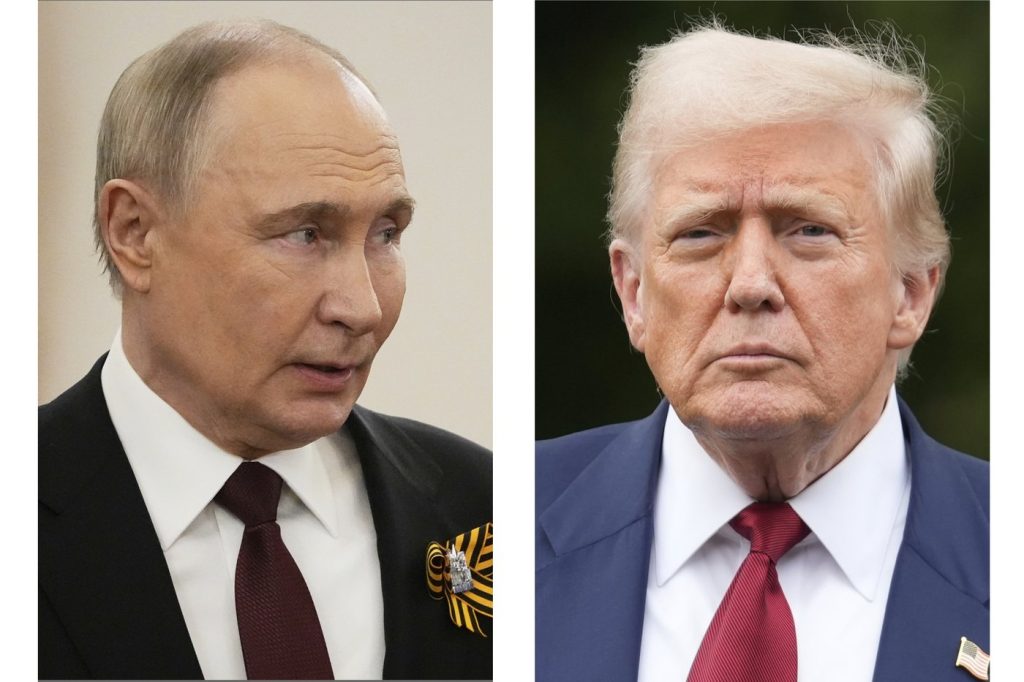Russian President Vladimir Putin has maintained his uncompromising stance regarding the ongoing war in Ukraine, utilizing threats and ultimatums to influence negotiations. With a planned summit with U.S. President Donald Trump in Alaska, concerns have arisen that Putin might pressure Ukraine into accepting unfavorable terms. These maximalist demands reflect Putin's long-standing objectives, established during the full-scale invasion of Ukraine that began on February 24, 2022.
Putin views a potential meeting with Trump as an opportunity to solidify Russia's territorial gains, ensuring Ukraine does not join NATO or host Western troops, thereby pulling it further into Russia's sphere of influence. The Russian leader believes that time favors him, as Ukrainian forces, exhausted and outgunned, face increasing challenges against Russian advancements along a front line exceeding 1,000 kilometers (over 600 miles).
Ukrainian President Volodymyr Zelenskyy remains steadfast in his approach, having agreed to a ceasefire proposed by Trump while firmly rejecting any abandonment of NATO membership and the acknowledgment of Russia's annexation of its territories. Ukraine's recent interactions with Russia underscored its commitment to sovereignty and territorial integrity, as outlined in a memorandum presented during the Istanbul talks in June.
Russia's position includes two propositions for a 30-day ceasefire. The first demands Ukraine withdraw its forces from the annexed regions of Donetsk, Luhansk, Zaporizhzhia, and Kherson, areas seized during Russia's offensive in September 2022. Alternatively, Russia proposed a "package agreement" requiring Ukraine to cease mobilization, freeze Western arms deliveries, and prohibit foreign troops on its territory. Following a truce, Moscow seeks legal recognition of its annexations and insists that Ukraine maintain a neutral status, limit its military size, and recognize Russian as an official language.
Conversely, Ukraine's memorandum highlighted the need for a full and unconditional ceasefire, emphasizing that any negotiations should respect its sovereignty and territorial claims. Ukraine's stance categorically rejects Russian demands for neutrality and any limitations on its military capabilities, alongside a refusal to recognize Russian territorial gains. Furthermore, Ukraine advocates for international security guarantees and the return of all displaced individuals, insisting on the total exchange of prisoners.
As for Trump's positions, his rhetorical admiration for Putin has raised concerns among Ukraine and European allies, who fear that his meeting with the Russian leader without Zelenskyy present could compromise Ukraine’s stance. Trump hinted at potential territorial exchanges but provided no specific details, further sowing unease about the implications for Ukraine's sovereignty. Observers suggested that Trump’s willingness to meet with Putin could enable the Russian leader to play a pivotal role in forcing Ukraine into concessions.
Putin's continued military actions have led many to interpret his potential concessions as tactical maneuvers aimed at gaining leverage rather than genuine willingness to negotiate. Analysts suggest he may use a temporary truce to cultivate favor with Trump while advancing his overall strategic objectives. Despite mounting pressure, analysts remain skeptical about any meaningful alterations to Russia's fundamental demands, primarily aimed at weakening Ukraine's resistance.
In summary, the prospects for peace negotiations remain tenuous, with Putin's conditions reflecting a demand for Ukraine’s capitulation masked as negotiation offers. The conflict is likely to persist as both sides hold firm to their positions, with the risk of further escalation looming large on the horizon.











